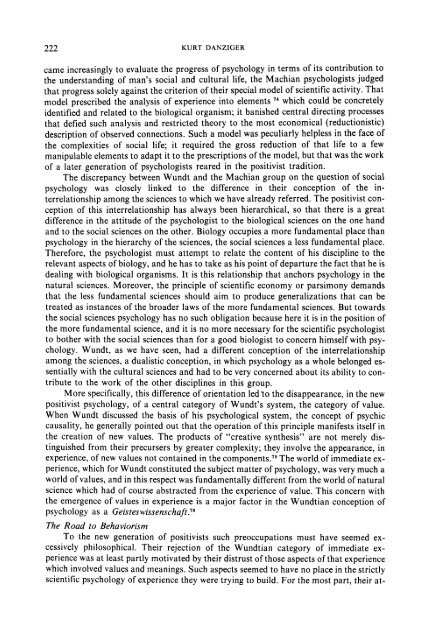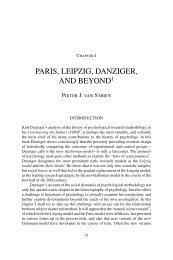The positivist repudiation of Wundt - Kurt Danziger
The positivist repudiation of Wundt - Kurt Danziger
The positivist repudiation of Wundt - Kurt Danziger
Create successful ePaper yourself
Turn your PDF publications into a flip-book with our unique Google optimized e-Paper software.
222 KURT DANZIGER<br />
came increasingly to evaluate the progress <strong>of</strong> psychology in terms <strong>of</strong> its contribution to<br />
the understanding <strong>of</strong> man’s social and cultural life, the Machian psychologists judged<br />
that progress solely against the criterion <strong>of</strong> their special model <strong>of</strong> scientific activity. That<br />
model prescribed the analysis <strong>of</strong> experience into elements 74 which could be concretely<br />
identified and related to the biological organism; it banished central directing processes<br />
that defied such analysis and restricted theory to the most economical (reductionistic)<br />
description <strong>of</strong> observed connections. Such a model was peculiarly helpless in the face <strong>of</strong><br />
the complexities <strong>of</strong> social life; it required the gross reduction <strong>of</strong> that life to a few<br />
manipulable elements to adapt it to the prescriptions <strong>of</strong> the model, but that was the work<br />
<strong>of</strong> a later generation <strong>of</strong> psychologists reared in the <strong>positivist</strong> tradition.<br />
<strong>The</strong> discrepancy between <strong>Wundt</strong> and the Machian group on the question <strong>of</strong> social<br />
psychology was closely linked to the difference in their conception <strong>of</strong> the in-<br />
terrelationship among the sciences to which we have already referred. <strong>The</strong> <strong>positivist</strong> con-<br />
ception <strong>of</strong> this interrelationship has always been hierarchical, so that there is a great<br />
difference in the attitude <strong>of</strong> the psychologist to the biological sciences on the one hand<br />
and to the social sciences on the other. Biology occupies a more fundamental place than<br />
psychology in the hierarchy <strong>of</strong> the sciences, the social sciences a less fundamental place.<br />
<strong>The</strong>refore, the psychologist must attempt to relate the content <strong>of</strong> his discipline to the<br />
relevant aspects <strong>of</strong> biology, and he has to take as his point <strong>of</strong> departure the fact that he is<br />
dealing with biological organisms. It is this relationship that anchors psychology in the<br />
natural sciences. Moreover, the principle <strong>of</strong> scientific economy or parsimony demands<br />
that the less fundamental sciences should aim to produce generalizations that can be<br />
treated as instances <strong>of</strong> the broader laws <strong>of</strong> the more fundamental sciences. But towards<br />
the social sciences psychology has no such obligation because here it is in the position <strong>of</strong><br />
the more fundamental science, and it is no more necessary for the scientific psychologist<br />
to bother with the social sciences than for a good biologist to concern himself with psy-<br />
chology. <strong>Wundt</strong>, as we have seen, had a different conception <strong>of</strong> the interrelationship<br />
among the sciences, a dualistic conception, in which psychology as a whole belonged es-<br />
sentially with the cultural sciences and had to be very concerned about its ability to con-<br />
tribute to the work <strong>of</strong> the other disciplines in this group.<br />
More specifically, this difference <strong>of</strong> orientation led ‘to the disappearance, in the new<br />
<strong>positivist</strong> psychology, <strong>of</strong> a central category <strong>of</strong> <strong>Wundt</strong>’s system, the category <strong>of</strong> value.<br />
When <strong>Wundt</strong> discussed the basis <strong>of</strong> his psychological system, the concept <strong>of</strong> psychic<br />
causality, he generally pointed out that the operation <strong>of</strong> this principle manifests itself in<br />
the creation <strong>of</strong> new values. <strong>The</strong> products <strong>of</strong> “creative synthesis” are not merely dis-<br />
tinguished from their precursers by greater complexity; they involve the appearance, in<br />
experience, <strong>of</strong> new values not contained in the component^.^^ <strong>The</strong> world <strong>of</strong> immediate ex-<br />
perience, which for <strong>Wundt</strong> constituted the subject matter <strong>of</strong> psychology, was very much a<br />
world <strong>of</strong> values, and in this respect was fundamentally different from the world <strong>of</strong> natural<br />
science which had <strong>of</strong> course abstracted from the experience <strong>of</strong> value. This concern with<br />
the emergence <strong>of</strong> values in experience is a major factor in the <strong>Wundt</strong>ian conception <strong>of</strong><br />
psychology as a Geisteswi~senschaft.~~<br />
<strong>The</strong> Road to Behaviorism<br />
To the new generation <strong>of</strong> <strong>positivist</strong>s such preoccupations must have seemed ex-<br />
cessively philosophical. <strong>The</strong>ir rejection <strong>of</strong> the <strong>Wundt</strong>ian category <strong>of</strong> immediate ex-<br />
perience was at least partly motivated by their distrust <strong>of</strong> those aspects <strong>of</strong> that experience<br />
which involved values and meanings. Such aspects seemed to have no place in the strictly<br />
scientific psychology <strong>of</strong> experience they were trying to build. For the most part, their at-





